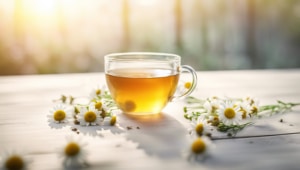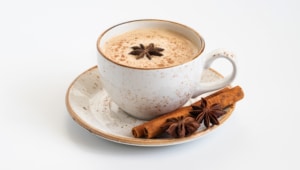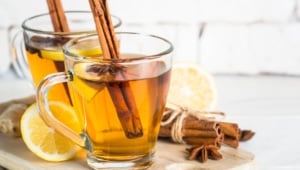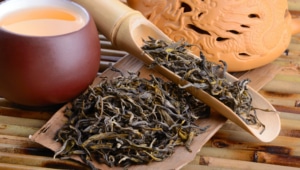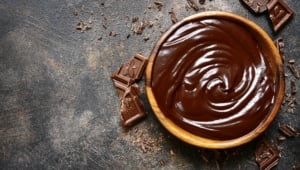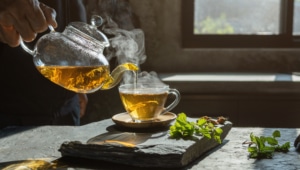5 Health Benefits of Black Tea & 3 Tips for Drinking
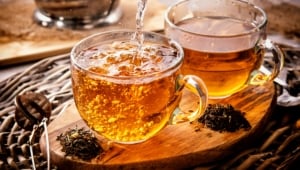
Black tea is the most widely drank type of tea in the USA. In this article, we’ll walk you through the different types, the health benefits of black tea, and recipes for making the best beverages around.
There are many different types of black tea, but the original was a very smoky kind known as Lapsang Souchong. Not only does this black tea, and many of its relatives, offer a range of unique and earthy flavors, it also has a range of health benefits.
What Black Tea Is: Interesting Facts
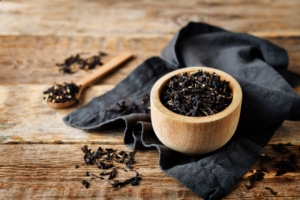
What Black Tea Is: Interesting Facts
In China the tea we know as black tea is actually called ‘red tea’ or Pu-erh. This was re-labelled as black tea by British and Dutch traders who first brought it to Europe.
Black tea is all grown from the Camellia Sinensis plant, but the way it’s grown and produced somewhat differs depending on where it comes from.
There’s Chinese Pu-erh, Indian Assam and Darjeeling, Sri Lankan Ceylon, and even Kenyan black tea.
In a way, this makes black tea comparable to coffee, which also differs based on the way it’s grown and treated in production. In the case of coffee, you will get different types of coffee plants.
Similarly with tea, there are two main types of Camellia Sinensis — the smaller-leafed, more cold, cold tolerant Chinese variety, and the ‘Assamica’ sub-group, which thrives in warmer places like India.
Origin and Where Black Tea Comes From

Origin and Where Black Tea Comes From
As the story goes, a tea factory in the Fujian Province delayed its production due to an army from Jianxi camping nearby. The delay meant the tea was left longer to ferment than it ordinarily would have.
This caused it to turn dark red. A farmer attempted to save the ‘spoiled’ tea leaves by drying them over a pine wood fire, to speed up the process. This resulted in the original black tea or Lapsang Souchong.
What Black Tea Is Made Of

What Black Tea Is Made Of
Black tea is made from leaves of the Camellia Sinensis bush. There are two types available, the Chinese plant and the Indian ‘Assamica’ sub-type. Leaves from either plant are left to oxidize and dry, and then either crushed or smoked first.
What Black Tea Tastes Like
Black teas come in a range of different natural flavors. Depending on how they were grown, harvested, and processed, the tea will range from dark brown to a pale red color. Some taste smooth, others can be smoky. There are stronger-tasting black teas, and more mellow ones.
Does Black Tea Have Caffeine?

Does Black Tea Have Caffeine?
A standard cup of black tea will have between 47-90 mg of caffeine. Earl Grey, which is black tea flavored with bergamot oil, appears to have the highest caffeine content next to regular black tea at 60-90 mg of caffeine.
Green Tea Versus Black Tea

Green Tea Versus Black Tea
Both green and black tea varieties are made from the leaves of the same Camellia Sinensis plant.
The difference is that black tea is left to completely oxidize, while the oxidation process is stopped in green tea. This is done by heating the green tea leaves, keeping them their distinctive green.
Green tea tends to taste lighter and a little more grassy and earthy-tasting than black tea. It contains less caffeine. Black tea is richer and more strongly flavored, and tends to contain more caffeine.
Black Tea Versus Coffee

Black Tea Versus Coffee
In terms of caffeine, an 8 fl oz cup of black tea contains around 47 mg of caffeine, while the same amount of freshly brewed coffee contains twice as much, at 95 mg.
Tea is also full of antioxidants and beneficial nutrients that aren’t present in coffee.
In short, coffee will give you a bigger ‘quick fix’ energy kick in the morning, but tea will provide more sustainable energy, relaxation, and helpful antioxidants.
Interestingly, tea is also more environmentally friendly. It only takes 34 liters to grow the leaves for a cup of tea, while it takes 140 liters for the same amount of coffee.
Nutritional Facts and Calories of Black Tea

Nutritional Facts and Calories of Black Tea
A standard cup of black tea contains a negligible number of calories, so long as you have your tea ‘black’ without added milk or sweeteners.
It does contain a number of different minerals and vitamins, including copper, magnesium, manganese, phosphorus, potassium, vitamin B2, vitamin B7, folate, choline, and myo-inositol.
Black tea also contains amino acids such as l-theanine and glutamate, and a variety of antioxidants, including polyphenols, theaflavins, and flavonoids. In other words, it’s chock full of goodness and offers plenty of health benefits.
Health Benefits of Drinking Black Tea

Health Benefits of Drinking Black Tea
Black tea, like its relative green tea, offers plenty of health benefits that are good for both your body and mind. While green tea and matcha are touted for their amazing health benefits, black tea, being from the same Camellia Sinensis plant, offers many of the same beneficial effects.
Promotes a Healthy Heart

Promotes a Healthy Heart
The theavlavins in black tea can help lower the bad cholesterol levels in your blood. In fact, experts claim that the risk of heart disease is reduced by 8 percent when you add black tea to your diet.
May Reduce the Risk of Stroke

May Reduce the Risk of Stroke
Some studies suggest that consuming three cups of black tea per day may prevent an ischemic stroke. Green tea offers the same potential benefits.
Ischemic stroke happens when you develop a blockage in your circulation, which blocks the blood supply to your brain. Experts suggest this is because of the presence of glutamate and theanine in black tea.
May Help Decrease Cancer Risks

May Help Decrease Cancer Risks
The polyphenols in black tea are said to decrease the risk of some types of cancer.
In fact, several studies have shown that all teas may have a preventative effect on oral cancer.
On the flipside, a smaller range of studies have suggested that black tea may increase the risk of rectal or colon cancer if used regularly.
Helps Improve Your Focus Levels

Helps Improve Your Focus Levels
The caffeine content of black tea is relatively high when compared with other types of tea. This is largely what may help with your energy levels and focus.
An 8fl oz cup of black tea will contain about 40 milligrams of caffeine, while the same amount of freshly brewed coffee will have around 75 mg of caffeine.
This means you’ll get that kick of energy without sending you into possible overdrive.
Lowers Your Blood Sugar Levels

Lowers Your Blood Sugar Levels
Adding black tea without extra sugar or sweeteners to your diet may decrease your blood glucose levels. Experts suggest it may even help your body manage sugar more efficiently.
Studies have shown that having black tea immediately after meals also improves the levels of blood sugars in pre-diabetic and non-diabetic adults.
Potential Risks

Potential Risks
As with anything, black tea offers both benefits and some risks. For the most part these are connected to consumption levels.
In other words, if you enjoy a moderate amount of black tea you’re very unlikely to experience any problems. Up to 4 cups per day are generally considered safe.
May Cause Symptoms of Anxiety and Jitteriness

May Cause Symptoms of Anxiety and Jitteriness
Black tea is generally less likely than coffee to cause you any symptoms of anxiety or jitteriness. This is because black tea contains less caffeine than coffee.
With that said, it still has enough caffeine to cause you some feelings of unease if you drink too much or are very sensitive to the effects of caffeine.
Interestingly, having some black tea may even help with anxiety or stress, due to the contents of l-theanine and myo-inositol.
Might Cause Headaches

Might Cause Headaches
Drinking vast amounts of black tea may cause headaches. This is because the caffeine content in black tea has the ability to narrow the blood vessels around your brain.
When you stop drinking tea, the blood vessels suddenly enlarge again, increasing pressure on the nerves in your head.
May Increase Urination
Having too much black tea may increase urination. This is largely because caffeine can stimulate your bladder, which causes you to feel a bigger urge to go to the bathroom.
Black tea is a known diuretic due to this effect. Of course, having too much of any liquid will also cause you to ‘go’ more frequently.
Is Black Tea in Pregnancy Good For You?

Is Black Tea in Pregnancy Good For You?
Black tea is perfectly safe in pregnancy, so long as you stay within the 200 mg limit of caffeine per day.
One or two cups of regular strength black tea (including iced tea) won’t do you or your baby any harm though, if in doubt, you should always check with your doctor.
Interestingly, while the antioxidants present in tea would normally be helpful for your body, they can hinder the absorption of iron. As many women are anemic during pregnancy, this could be a problem.
Some of the regular health benefits of black tea could be helpful for pregnant women, too, though you may wish to look into other sources of these nutrients.
Just enjoy a cup or two of black tea, especially if you normally have a cup of coffee, but don’t rely on it for any added nutritional value.
Simple Guide for Making the Perfect Black Tea
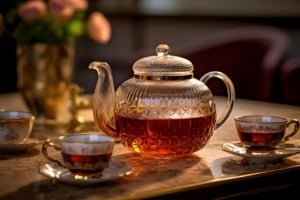
Simple Guide for Making the Perfect Black Tea
Black tea is flavorful and you can enjoy it in a variety of ways — hot, cold, with milk, with sugar, with added flavoring.
Arguably one of America’s most favored black tea-based beverages, however, is iced tea. Here is a recipe for the perfect black tea — iced and with plenty of added sugar.
Ingredients:
- 8 cups of water
- 6 bags of your favorite black tea
- ⅓ cup of granulated or brown sugar
- A dash of fresh lemon juice
And here’s how you do it:
- Boil half of the water in a pot and remove it from the heat. Add the tea bags and allow your tea to steep for around 10 minutes.
- Next, remove the tea bags and add the sugar. You may add more or less sugar, depending on your taste. Stir the still hot tea until the sugar is all dissolved.
- Add the rest of the water and the lemon juice to your tea. Refrigerate until nice and cold.
- Serve in chilled glasses with some added ice, fresh mint, and lemon or peach slices, and enjoy.
Tips for Drinking and Serving Black Tea

Tips for Drinking and Serving Black Tea
Black tea is flavorful on its own, but can be slightly bitter and a little strong for some tastes.
Adding a variety of different ingredients can really change its flavors and texture, making your black tea sweeter, creamier, and more delicious.
Here are some of our favorite tips for drinking and serving black tea.
Add Honey, Lemon, or Even Mint

Add Honey, Lemon, or Even Mint
Depending on where you go, black tea is served in vastly different ways. Some Arabic recipes include plenty of fresh mint leaves and sugar, while Southern sweet tea is served iced and with lots of sugar and lemon slices.
You may also add honey for its immune-boosting properties – particularly good when you’re fighting off a cold or flu.
Add Your Favorite Plant-Based Milk

Add Your Favorite Plant-Based Milk
There are plenty of plant-based alternatives to dairy milk. It doesn’t matter whether you need to substitute regular milk with a natural alternative because you have an intolerance, or because you’re vegan.
One of the most popular options is oat milk, which is lactose-free and dairy-free. It’s creamy and doesn’t add too much additional flavor (as for example almond or coconut milk might).
With that said, if you prefer a sweeter tea, you may prefer soy milk, which has a lovely natural sweetness.
Learn here more about almond milk.
Make Some Boba or Bubble Tea

Make Some Boba or Bubble Tea
You can buy some tapioca pearls at your favorite Asian supermarket or online. Cook them per the package instructions, then marinate them in simple sugar syrup.
You can make your own sugar syrup by simply mixing sugar and warm water, and stirring until no longer grainy. Next, brew a strong black tea and mix with the tapioca pearls and some milk of your choice.
- Chai Tea. Health Benefits and Hacks.
- Raspberry Leaf Tea. Tips, Hacks and Health Benefits.
- Starbucks Refresher. Tips and Best Drinks.
- Jelly Belly Flavors. Best and Grossest.
- Boba Flavors. Best Flavors and Types.
- Pop Tart Flavors. Tasty Alternatives and Best Flavors.
- Cinnamon Tea. Health Benefits and Tips.
